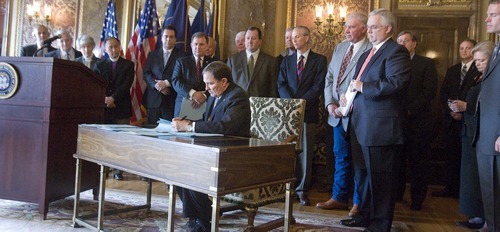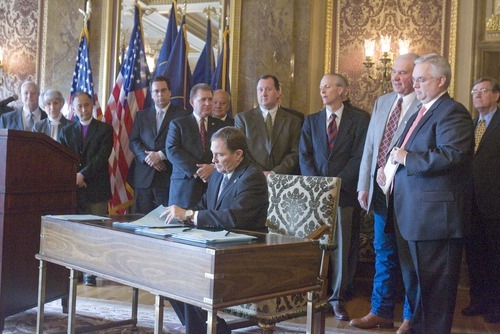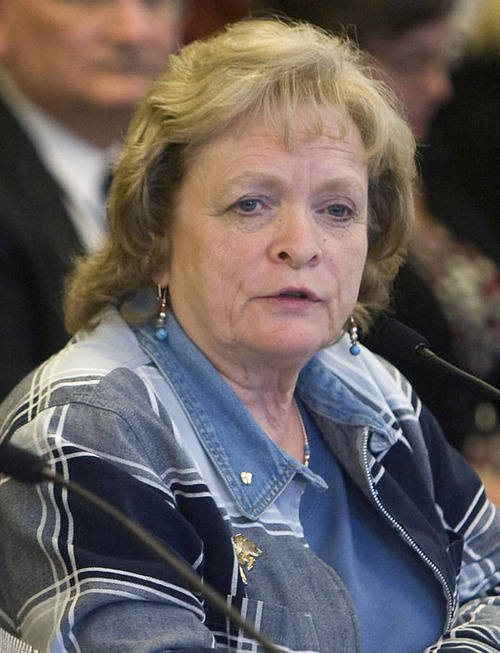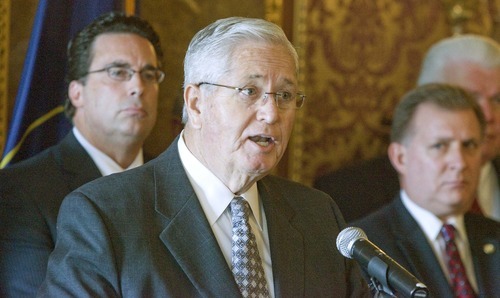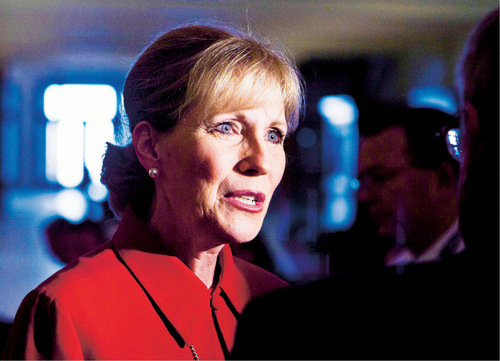This is an archived article that was published on sltrib.com in 2011, and information in the article may be outdated. It is provided only for personal research purposes and may not be reprinted.
For decades, Mormon conservatives have believed their politics on a number of issues matched with the positions of their church. They opposed abortion, the Equal Rights Amendment and same-sex marriage, for example, and so did their religion.
But now comes an issue that puts the two seemingly at odds: immigration.
The Utah-based Church of Jesus Christ of Latter-day Saints has called for compassion — not just strict enforcement, as these members demand — when dealing with undocumented immigrants. It has urged politicians not to divide families, while some members support detention and deportation. The faith has unequivocally lauded Utah's guest-worker bill, HB116, which some leading Mormon conservatives are pushing to repeal.
Unlike LDS liberals, who long have struggled to balance support for their church with disagreement over some of their faith's stances, these conservative members find themselves in an unfamiliar place.
And it's as uncomfortable as it is unexpected.
These Mormons have many ways of explaining their newfound dissonance — denial, picking on details, parsing words, downplaying differences or blaming the church's global distractions.
"This is a real crisis for some people," says Todd Weiler, former chairman of the Davis County Republican Party. "They want to be good Mormons, yet they are absolutely convinced that HB116 is amnesty and is bad."
They are, he says, "freaking out."
—
Coping strategies
Not one conservative Mormon contacted by The Salt Lake Tribune — even those against the guest-worker law the church is for — acknowledged opposing their religion on immigration.
Freshman Sen. Mike Lee, R-Utah, campaigned on eliminating the constitutional amendment that gives any baby born in America automatic citizenship and has expressed reservations about HB116, saying it would be hard to get Congress to act on a proposal that "has the look and feel of amnesty."
Yet Lee also says he applauds his church's emphasis on compassion and humanitarian concerns.
"I don't think they were saying if you are a Latter-day Saint, you should say nothing but wonderful things about HB116," Lee says, "or that anyone who voted against it has betrayed their religion."
Lee favors a piecemeal approach to federal immigration reform, starting with improving the path for legal immigration. He doesn't see himself against the church's stance in any way.
Like Lee, Cherilyn Eagar, who sought the Senate seat Lee now holds, sees herself in step with the LDS Church, even though she is spearheading a campaign to repeal HB116.
"Many would like to see changes in the bill," Eagar says. "To the degree that this particular law is unconstitutional, we need to work together to fix those loopholes."
Eagar says she supports principles spelled out in the new LDS handbook, which encourages members to stay in their home countries, and, if they choose to emigrate, comply with their new country's laws. She also says she has urged national opposition groups not to criticize her church.
The Holladay activist understands, she says, that her 14 million-member faith has a responsibility to "protect its interests. I don't disagree with that at all."
The LDS Church, or any church with an international membership, "has to protect its diplomatic relations," she says. "That's important to keep their missionary efforts going forward."
—
Free agency
To its credit, Eagar says, the church does not expect members to follow blindly but rather encourages them to think for themselves, study the issues and come to their own conclusions.
"We don't have to agree with every policy and everything that is spoken from church leaders' mouths,"she says. "Nobody [from the church] has called me and suggested that I should be challenged on my membership."
Even so, she is amazed at the amount of "hate mail" she has received from members, demanding she be excommunicated because of her opposition to the bill.
That same kind of furor and antagonism surrounded Mormons in California, who opposed Proposition 8, recognizing marriage as exclusively between a man and a woman.
In the heat of that campaign, LDS general authority L. Whitney Clayton said Latter-day Saints are free to disagree with their church on that issue without any sanction.
"We love them," Clayton said, "and bear them no ill will."
That same tolerance is in place this time as well, LDS officials say.
Eagar sees no comparison between her efforts against illegal immigration and those of Prop 8 opponents.
That was a "doctrinal issue," Eagar says. "This [immigration] is not a doctrine; it's a policy."
"We can have differences of opinion," she adds, "but we never want to be criticizing the church in a way that is tearing it down."
That is something, Eagar says, she never has done and never would do.
—
Says who?
Throughout the current debate, some Mormon opponents of illegal immigration have tried to pin their church's position on the faith's public-affairs department, its lobbyists or individuals.
These members rightly point out the message has come from news releases and Web postings, not from a First Presidency letter, like it did with Prop 8. Or they claim that Presiding Bishop H. David Burton attended the signing of Utah's immigration bills as an individual, though he noted his presence "testified" of the church's approval.
"I have yet to see that this is coming down from top officials of the church," insists Ron Mortensen, co-founder of the Utah Coalition on Illegal Immigration. "I see this as coming from the public-relations officials."
If LDS President Thomas S. Monson — whom Mormons view as a "prophet, seer and revelator" — issues a statement to the whole church, Mortensen says, "I'd have to look at it and make my decision. It would take some soul-searching."
Responding to such views, the LDS Church issued its most explicit statement yet, reiterating its immigration position and mentioning its approval of HB116.
The LDS Church Public Affairs Department "does not act independently of church leadership," spokesman Scott Trotter said this week. "Official statements on the [LDS] church websites are approved at the highest level."
The spokesman went further, pointedly adding: "The church is naturally concerned when some members deliberately misrepresent its leaders and actions. In such cases, the church reserves the right to publicly correct the record."
—
Been here before
Gayle Ruzicka, whose Eagle Forum opposes any legislation that it sees as leaning toward amnesty, accepts her church's position. Yet she shares Eagar's view that HB116 should be scrutinized and amended.
"There might be some good things we can keep, but it's unconstitutional," Ruzicka says. "Let's sit down together and look at it."
She does worry, however, about the hostility over the church's immigration stance in some LDS quarters.
"There's some angry people and some hurt people," she says. "It's time for them to exercise their faith. If you believe President Monson is a prophet, you're not going to leave the church over this."
Ruzicka urges such members to calm down.
"If you disagree, you are not going to lose your temple recommend or membership. You are not going to be treated poorly [by members of your ward or the church.] People have their agency," she says. "Get on your knees and take it to the Lord. You decide how you fit into this picture."
Ruzicka says she has found herself to the right of her church on abortion and on gay-rights issues, and had to work through the differences.
"It had nothing to do with my faith," she says. "As time passes, I always find out why [the prophet] was right. That's why he's the prophet and I'm not."
And, Ruzicka adds, she's in that place again.
—
Differing dilemmas
In his book, Moral Politics: How Liberals and Conservatives Think, George Lakoff describes the two camps using separate familial metaphors. The best metaphor for the conservative worldview, Lakoff writes, is the "strict father." In this model, self-control and self-discipline as well as respect for and obedience to authority are the highest values.
By contrast, the liberal ethos is more like the "nurturant parent," model, Lakoff notes, which emphasizes empathy for others and helping those in need, both in the family and in the community.
Each category includes the other values, he writes, but assigns them different priorities.
Given this perspective, liberal Mormons may have an easier time negotiating differences with their church than conservatives, says Utah Valley University professor Boyd Petersen, since obedience is less important to them than compassion.
"A liberal might feel like she was being true to the spirit of the law, even if she were disagreeing with the rules of the church," Petersen says. "But conservatives, with their obedience-oriented frame, are faced with obedience to competing authorities —- their church and the rules."
In the case of immigration, he says, some may be "obeying" their political party more than their church.
—
Advice from the Left
Laura Compton, a California Mormon who helped organize Mormons for Marriage to oppose Prop 8, wrestled with this dilemma for years so she can empathize with some conservative Latter-day Saints on immigration.
"It's not easy when you find yourself on the opposite side of the fence from the men you believe are prophets, seers and revelators," Compton writes in an email. "But I don't have to agree with somebody 100 percent in order to sustain them, to recognize their wisdom, to acknowledge them as leaders and assume their good intentions."
She advises any Mormon, conservative or liberal, to develop a "thick skin" against hurtful comments and to remember that LDS "scriptures and church history are jampacked with humans who make mistakes, disagree, debate and understand the gospel differently."
State Sen. Ben McAdams — an Avenues Democrat who helped in the negotiations that led the LDS Church to endorse Salt Lake City's ordinances protecting gays against housing and job discrimination — is at peace with who he is as a faithful Latter-day Saint, striving to follow his conscience while respecting those who differ.
"The LDS Church does not have a doctrine of infallibility," McAdams says. "Faith is not about an institution. The institution exists to help me to develop attributes I need to be a better person."
In the end, he says, what's important is the courage to stand up for what you believe.
Faith is so much more than the tide of current events, McAdams says. "We're in this for the long haul."
—
Many Utahns in the dark about LDS stance
Nearly 50 percent of Utah voters were not aware that the LDS Church favors HB116 — which authorizes a guest-worker program allowing undocumented immigrants to pay fines and stay in the state — according to a recent Utah Voter Poll.
The poll found that same uncertainty among active Mormons and among active Mormons who also are Republicans (42 percent and 43 percent, respectively, didn't know their church's stand on HB116).
Among those who said they knew the LDS position, a fifth thought — incorrectly — that the church opposed the guest-worker bill.
The results show "a significant lack of clarity among Utahns about the LDS Church's stance and the challenge of moving individuals away from their predispositions," writes Chris Karpowitz on the website, http://utahdatapoints.com, associated with Brigham Young University's Center for the Study of Elections and Democracy.
Karpowitz, an assistant professor of political science at BYU, added that more educated respondents were "significantly more likely to believe that the [LDS] Church supported the immigration bills."
This connection between education and awareness of the LDS position may be explained by the fact that the Utah-based faith did not express its immigration positions through ecclesiastical channels such as LDS General Conference or a formal letter to Mormon congregations, Karpowitz writes, but rather through "the media, the church's own website and its presence at the governor's signing ceremony at the end of the legislative session."
This Utah Voter Poll was conducted March 30-April 9, with 743 respondents who were randomly sampled for participation in an Internet survey. The poll does not reflect the LDS Church's April 19 statement clarifying its explicit support of HB116.
Peggy Fletcher Stack


